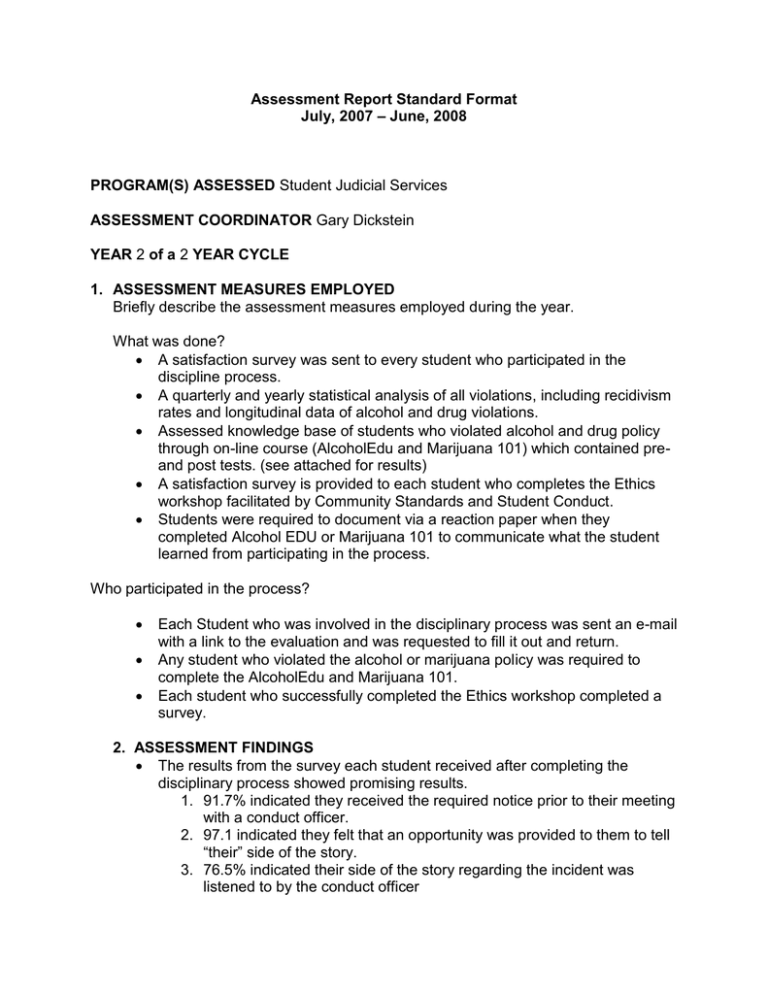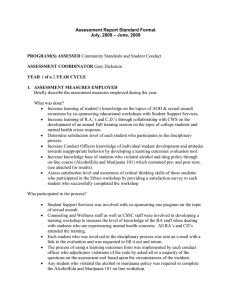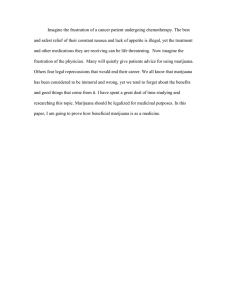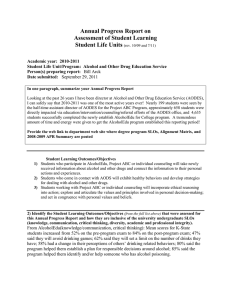Judicial Affairs
advertisement

Assessment Report Standard Format July, 2007 – June, 2008 PROGRAM(S) ASSESSED Student Judicial Services ASSESSMENT COORDINATOR Gary Dickstein YEAR 2 of a 2 YEAR CYCLE 1. ASSESSMENT MEASURES EMPLOYED Briefly describe the assessment measures employed during the year. What was done? A satisfaction survey was sent to every student who participated in the discipline process. A quarterly and yearly statistical analysis of all violations, including recidivism rates and longitudinal data of alcohol and drug violations. Assessed knowledge base of students who violated alcohol and drug policy through on-line course (AlcoholEdu and Marijuana 101) which contained preand post tests. (see attached for results) A satisfaction survey is provided to each student who completes the Ethics workshop facilitated by Community Standards and Student Conduct. Students were required to document via a reaction paper when they completed Alcohol EDU or Marijuana 101 to communicate what the student learned from participating in the process. Who participated in the process? Each Student who was involved in the disciplinary process was sent an e-mail with a link to the evaluation and was requested to fill it out and return. Any student who violated the alcohol or marijuana policy was required to complete the AlcoholEdu and Marijuana 101. Each student who successfully completed the Ethics workshop completed a survey. 2. ASSESSMENT FINDINGS The results from the survey each student received after completing the disciplinary process showed promising results. 1. 91.7% indicated they received the required notice prior to their meeting with a conduct officer. 2. 97.1 indicated they felt that an opportunity was provided to them to tell “their” side of the story. 3. 76.5% indicated their side of the story regarding the incident was listened to by the conduct officer 4. 75% indicated they believed the sanction(s) they received as a result of their conduct conference were appropriate. 5. 71% indicated they believed the incident and consequences caused them to think more about how my behavior affected themselves or others. 6. 93.8% indicated they believed, as a result of the incident and consequences, that they would be less likely to repeat the behavior in the future. Alcohol EDU 1. Data from the Alcohol EDU survey indicates that the following: Eighty-nine percent (89%) of your students reported that AlcoholEdu prepared them to help in situations where they have identified an alcohol overdose. Eighty-nine percent (89%) of your students considered that AlcoholEdu prepared them to express concern to someone about their alcohol use. Eighty-eight percent (88%) of your students said they paid attention to the course. Eighty-nine percent (89%) found the course helpful to them. Seventy-three percent (73%) would recommend AlcoholEdu to other people Overall, Wright State University students reported an increase in the use of protective factors after completing the course. Most notably, the percentage of students who reported they think about their BAC while drinking increased substantially from 49% to 61%. Awareness of BAC is an important factor in moderating alcohol consumption and intoxication. Despite the influence of the College Effect, WSU students had a higher rate of abstention and lower rates of heavy-episodic and problematic drinking, after engaging with AlcoholEdu for College. Furthermore, students reported that AlcoholEdu prepared them very well to deal with problematic alcohol use. Marijuana 101 1. As of this time, data is still not available from Marijuana 101 due to less than the 100 students needed to complete the course during the 20072008 academic year. Ethics Survey 1. The findings from the ethics workshop evaluations were very positive in nature. The majority of participants felt the workshop to be helpful and made them aware of the ethical dilemmas of their past actions. They thought the workshop aided in their thought process and some said they found themselves asking ethical questions daily. One student didn’t feel they learned anything about ethics through the workshop. The majority of participants felt that their views were changed and better developed due to the workshop and made them think more about their decision making. However, there were a small number of people who felt their ethics/integrity had not changed from the beginning of the workshop to the end and feel they already embodied a well developed ethical thought process. 3. List the LEARNING OUTCOMES of the program. Each student who is required to complete the Alcohol Edu. or Marijuana 101 class will achieve a passing score of at least 80% on the required post test. a. During the 07-08 academic year, 153 individuals participated in the AlcoholEdu program; however 135 finished the entire program. Each of those students who completed the program did so with a score of 80% or better on the post-exam. Additional statistical data was requested from the company for the students who finished, but has yet to be received. b. 87 of the 87 (100%) of the students who completed the Marijuana 101 program obtained a score of at least 80%. Each student who participates in the Ethics workshop will, by the last session, have a better understanding of the ethical repercussions of the decisions they make. a. The ethics workshop will again be offered each academic quarter. 3. PROGRAM IMPROVEMENTS Collaborate with the Alcohol EDU company to produce statistical report when “N” is smaller than 100 users. 4. ASSESSMENT PLAN COMPLIANCE Explain deviations from the plan (if any). None 5. NEW ASSESSMENT DEVELOPMENTS Describe developments (if any) regarding assessment measures, communication, faculty or staff involvement, benchmarking, or other assessment variables.





